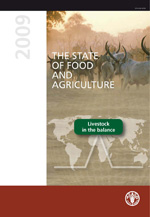The FAO has published the paper: Crop residue based densified total mixed ration: A user-friendly approach to utilise food crop by-products. In this publication, the authors argue that “crop residues are valuable resources since they form a bulk of ruminant feed in many tropical countries. Due to lack of effective management of these resources, unfortunately they are being burnt in some countries, causing environmental pollution. The digestibility of crop residues and other low quality forages can be increased through the action of rumen microbes by strategically mixing nitrogen and minerals that are deficient in these feed resources. The increase in digestibility of crop residues and low quality forages, in turn also increases their intake. Both these phenomena enhance the efficiency of nutrient utilization from these feed resources in animal food chains.
To achieve this, the present paper discusses a technology based on the formation of a complete diet in the form of densified feed blocks or pellets from straws mixed with minerals, oil seed cakes and other agroindustrial by-products. The methods for preparation of such total mixed rations, their use and impact have been presented. It is hoped that this technology will enhance income of farmers, decrease environmental pollution and help alleviate shortage of good quality feeds in tropical countries. In addition, the feed produced in the densified form as blocks or pellets could also provide complete feed to livestock in emergency situations. Public-private partnership is expected to enhance the application and impact of this technology”.
This publication is available from the FAO website


